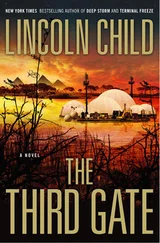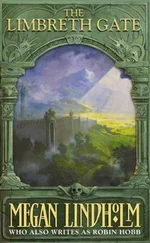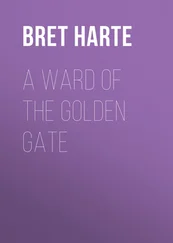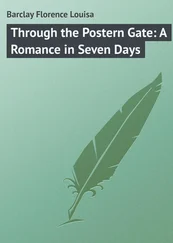Closed in these meditations, he came once more into that presence-chamber, with its sea-horse staircase, and here was one of the Queen’s chamberlains with her highness’s bidding that Doctor Vandermast should attend her in the privy garden. The doctor followed him; and, passing on their way through a vaulted corridor hewn in the rock and brightly lighted with hanging lamps, they were met with a nurse leading in her hand a child yet in his side-coats, of two or three years old. The doctor viewed the boy narrowly, and the boy him. ‘What child was that?’ he asked, when they were gone by. The chamberlain, with a skewing of his eye at him as of one smally trusting old vagrant men that were likely sprung of a stone and certainly best told nothing, as soonest mended, answered that it was one of the children of the palace, he knew not for sure which. Which answer the learned doctor let go without further remark.
‘It is her highness’s pleasure,’ said the chamberlain, at the garden gate, ‘to receive you in private. Be pleased to walk on’: so Vandermast entered in alone and stood before Queen Stateira.
She was sitting sideways now on the jewelled bench, her feet up, sewing a kirtle of white satin embroidered with flowers of silver. Upon the doctor’s coming she but glanced up and so back to her needlework. It was yet bright sunshine, but with the wearing of the afternoon the shadow of that gold and ivory statue of our Lady of Paphos no longer touched the Queen where she sat. The air was colder, and she had a high-collared cloak about her shoulders of rich brown velvet, coloured of the pine-marten’s skin in summer and lined with vair. He waited, watching her, while she with down-bended eyes plied her needle. Nought else stirred, except now and then a blazing of hot colour where her hair caught the sun, and except, where the pleated neck-ruff of her gown ran lowest, the gentle fall and swell of her breathing. After a little, she raised her eyes. ‘Can you guess, reverend sir, why I have sent for you?’ The sun was behind her, and her countenance not to be read.
He answered, ‘I will not guess, for I know.’
‘Then tell me. For, in good sadness, I know not why I did it. Answer freely: you see we are alone.’
‘Because,’ answered he, after a moment’s silence, ‘your highness is fugitive and homeless, therefore you did do it; vainly expecting that the will-o’-the-wisp of an old man’s fallible counsel should be a lamp to light you home.’
‘These are strange unlikely words,’ she said. ‘I know not how to take them.’
‘Truth,’ said Vandermast gently, ‘was ever a strange wild-fowl.’
‘Truth! I that was born and bred in Rialmar, where else then shall I be at home? I that am your Queen, how should I be a fugitive, and from what?’
‘To be here before your time is to be homeless. And the necessity you flee from is necessity by this cause only, that yourself (albeit I think you have forgotten) did choose it to make it so.’
The violent blood suffused all her face and neck, and with the suddenness of her half-rising from her seat the rich and costly embroidery slid from her lap and lay crumpled on the ground. She sat back again: ‘I see you are but some phantastical sophister who with speaking paradoxically will gain the reputation of wisdom and reach. I’ll listen to no more.’
‘I am nought else,’ answered that aged man, painfully upon one knee retrieving the fallen satins, ‘than your highness’s creature and servant. You do misprize, moreover, the words I spake, referring unto one particular accident what was meant in a generality more loftily inclusive.’ Then, standing again in respectful reverence before her, ‘And yet, it fits,’ he said, under his breath as to himself only; but the Queen, with head bowed as before over her needlework, seemed to shrink, as though the words touched her on a wound.
‘I have lost my needle,’ she said. ‘No. Here it is.’ Then, after a long pause, still sewing, and as out of a deep unhappiness: ‘Will the gull choose to dash herself against the Pharos light? Will a seaman, where the tide runs in the wind’s teeth between skerry and skerry, choose to be there in a boat without a rudder? Why should I?’
‘How shall any earthly being but your highness’s self answer that? Perhaps ’twas in the idle desire to feel your power.’
With that, the Queen’s hand stopped dead. ‘And you are he they tell me can read a man’s destiny in his eyes? Can you not read in mine,’ and she raised her head to meet his gaze, ‘that I have no power? that I am utterly alone?’
‘The King’s power is your power.’
She said, resuming her sewing, ‘I begin to dread it is not even his.’
‘It is yours, will you but use it.’
She said, bending her white neck yet more to hide her face, ‘I begin to think I have lost the knack to use it.’ Then, scarce to be heard: ‘Perhaps even the wish.’
Doctor Vandermast held his peace. His eyes were busied between this woman and this statue: this, more like in its outward, may be, to the unfacing reality, but of itself unreal, a mere mathematic, a superficies: that other real, but yet, save for an inner and outer loveliness, unlike, because wanting self-knowledge; and yet putting on, by virtue of that very privation, a perfection unique and sufficient unto itself albeit not belonging to the divine prototype at the fulness of Her actual; even as the great lamp of day has at sunrise and at sunset perfections of uncompleteness of transience which are consumed or blotted out in the white flame of noon.
‘You are a strange secret man,’ she said presently, still without looking up, ‘that I should have spoke to you thus: things I’d a spoken to no creature else in the world. And, until today, ne’er so much as set eyes on you.’ Then, suddenly gathering up her needlework, ‘But you give me no help. No more than the other standers by or hinderers.’
He said, ‘There is none hath the ability to help your highness, except only your highness’s self alone.’
‘Here’s cold comfort, then. Yet against burning, I suppose, there may be some good in coldness.’
She rose now and walked a turn or two in silence, coming to a stand at last under the statue; looking up at which, and with a face averted from that aged doctor, she said to him, ‘True it is, I did send for you in a more weightier matter than this of me. I have a son.’
‘Yes.’
‘Can you read stars and significations in the heaven?’
‘Be it indeed,’ he replied, ‘that in the university of Miphraz I did seven years apply my youth to study in the Ultramundanes and the Physicals, I have long since learnt that there is no answer in the mouth of these. My study is now of the darkness rather which is hid in the secret places of the heart of man: my office but only to understand, and to watch, and to wait.’
‘Well, have you seen the child? What find you in him? Give me in a word your very thought. I must have the truth.’ She turned and faced him. ‘Even and the truth be evil.’
‘If it be truth,’ said the doctor, ‘it can in no hand be evil; according to the principle of theoric, Quanta est, tanto bonum , which is as much as to say that completeness of reality and completeness of goodness are, sub specie aeternitatis , the same. I have beheld this child like as were I to behold some small scarce discernible first paling of the skies to tomorrow’s dawn, and I say to you: Here is day.’
‘To be King in his time?’
‘So please the Gods.’
‘In Fingiswold, after his father?’
‘So, and more. To be the stay of the whole world.’
‘This is heavenly music. Shall’t be by power, or but by fortune?’
‘By power,’ answered Vandermast. ‘And by worth.’
Читать дальше












